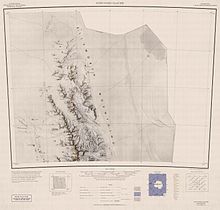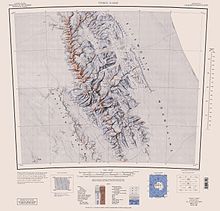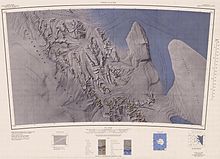



Rutford Ice Stream (79°00′S 81°00′W / 79.000°S 81.000°W) is a major Antarctic ice stream, about 290 kilometres (180 mi) long and over 24 kilometres (15 mi) wide, which drains southeastward between the Sentinel Range, Ellsworth Mountains and Fletcher Ice Rise into the southwest part of Ronne Ice Shelf. Named by US-ACAN for geologist Robert Hoxie Rutford, a member of several USARP expeditions to Antarctica; leader of the University of Minnesota Ellsworth Mountains Party, 1963-1964. Rutford served as Director of the Division of Polar Programs, National Science Foundation, 1975-1977.[1]
The ice stream is situated in a deep trough which is a tectonic feature between the Ellsworth Mountains and the Fletcher Promontory. Because of this the ice stream position may have been stable for millions of years. The bed of the ice stream reaches 2,000 metres (6,600 ft) below sea level. Therefore, between the bed of the ice stream and the height of the Ellsworth Mountains there is a vertical relief of 7 kilometres (4.3 mi) over a distance of only 40 kilometres (25 mi).[2] At the upper (inland) end of the ice stream the ice thickness reaches 3,100 metres (10,200 ft) falling to around 2,300 metres (7,500 ft) in the trough. Flow speed reaches a maximum of around 400 metres (1,300 ft) per year about 40 kilometres (25 mi) inland from where the ice stream meets the Ronne Ice Shelf and starts to float on the sea.[2]
The speed of the Rutford ice stream varies by as much as 20% every two weeks, in response to variations in the tides.[3]
- ^ "Rutford Ice Stream". Geographic Names Information System. United States Geological Survey. Retrieved 6 November 2009.
- ^ a b Doake, C.; H. Corr; A. Jenkins; K. Makinson; K. Nichalls; C. Nath; A. Smith & D. Vaughan (2001). "Rutford Ice Stream, Antarctica". In Alley, Richard & Bindschadler, Robert (eds.). The West Antarctic Ice Sheet: Behaviour and Environment. American Geophysical Union. pp. 221–235. ISBN 0-87590-957-4.
- ^ ScienceDaily, Tidal Motion Influences Antarctic Ice Sheet Dec. 24, 2006